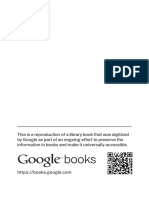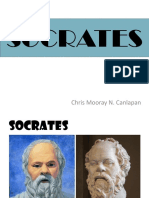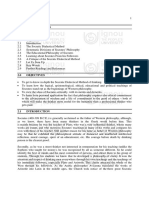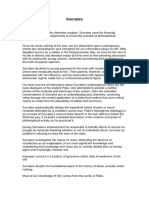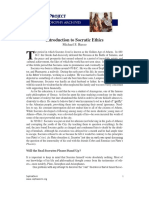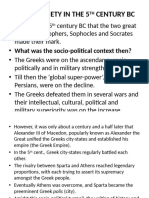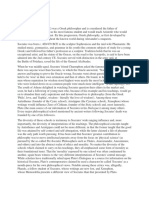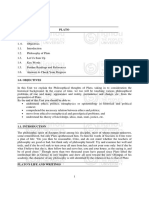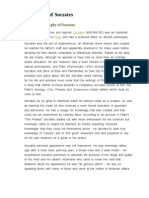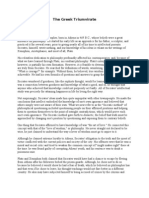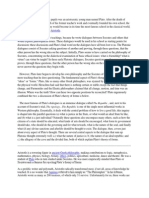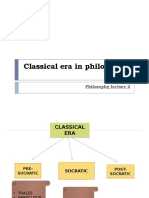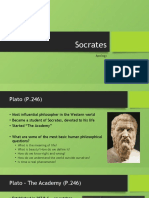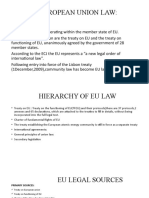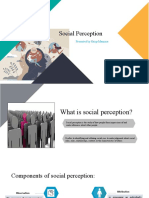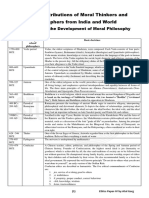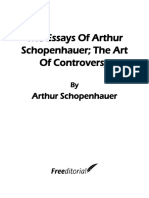0 ratings0% found this document useful (0 votes)
12 viewsSocrates
Socrates
Uploaded by
tehreem manzoorSocrates was the first philosopher to turn from studying nature to focusing on human affairs and politics. This led to a long tradition of examining the relationship between philosophy and political society. The political outcome was Socrates' trial and death, while the philosophical outcome was developing a rational theory of morality combining knowledge and virtue through Socratic questioning. Socrates used questioning to challenge experts and leaders while seeking reconciliation between philosophy and politics. His trial shows how the pursuit of wisdom can threaten authorities but also looks for common ground.
Copyright:
© All Rights Reserved
Available Formats
Download as PPTX, PDF, TXT or read online from Scribd
Socrates
Socrates
Uploaded by
tehreem manzoor0 ratings0% found this document useful (0 votes)
12 views24 pagesSocrates was the first philosopher to turn from studying nature to focusing on human affairs and politics. This led to a long tradition of examining the relationship between philosophy and political society. The political outcome was Socrates' trial and death, while the philosophical outcome was developing a rational theory of morality combining knowledge and virtue through Socratic questioning. Socrates used questioning to challenge experts and leaders while seeking reconciliation between philosophy and politics. His trial shows how the pursuit of wisdom can threaten authorities but also looks for common ground.
Original Title
Socrates (2)
Copyright
© © All Rights Reserved
Available Formats
PPTX, PDF, TXT or read online from Scribd
Share this document
Did you find this document useful?
Is this content inappropriate?
Socrates was the first philosopher to turn from studying nature to focusing on human affairs and politics. This led to a long tradition of examining the relationship between philosophy and political society. The political outcome was Socrates' trial and death, while the philosophical outcome was developing a rational theory of morality combining knowledge and virtue through Socratic questioning. Socrates used questioning to challenge experts and leaders while seeking reconciliation between philosophy and politics. His trial shows how the pursuit of wisdom can threaten authorities but also looks for common ground.
Copyright:
© All Rights Reserved
Available Formats
Download as PPTX, PDF, TXT or read online from Scribd
Download as pptx, pdf, or txt
0 ratings0% found this document useful (0 votes)
12 views24 pagesSocrates
Socrates
Uploaded by
tehreem manzoorSocrates was the first philosopher to turn from studying nature to focusing on human affairs and politics. This led to a long tradition of examining the relationship between philosophy and political society. The political outcome was Socrates' trial and death, while the philosophical outcome was developing a rational theory of morality combining knowledge and virtue through Socratic questioning. Socrates used questioning to challenge experts and leaders while seeking reconciliation between philosophy and politics. His trial shows how the pursuit of wisdom can threaten authorities but also looks for common ground.
Copyright:
© All Rights Reserved
Available Formats
Download as PPTX, PDF, TXT or read online from Scribd
Download as pptx, pdf, or txt
You are on page 1of 24
Ethics: Socrates
• Socrates, who claimed to know nothing and
probably wrote nothing, is nonetheless the first
to see the connections between the
philosopher's search for truth and the world of
politics.
• Socrates was the first philosopher to turn away
from the study of nature to exclusive concern
with human affairs, and began a long tradition
of reflection on the encounter between the
philosopher's love of wisdom and the
established conventions of political society.
• The political outcome of this first encounter
between philosophy and political society in the
history of political thought is the trial and
death of Socrates. The Vlastos school holds
that the philosophical outcome of this is a
rational theory of morality embodying the
Socratic technique of elenchus, the method of
question and answer, and which unites
knowledge with virtue.
• Socrates’ conception of virtue, the so-called
Socratic paradoxes, the method of question
and answer (the elenchus), and the use of the
craft analogies are among the ideas to define
the unique role of the philosopher in relation
to 'the many' in society.
• Socrates’ trial and death, is examined through
Plato's dialogues the Apology and Crito.
Socrates shows here how the quest for
wisdom challenges the acknowledged
experts and leaders in society, but at the
same time looks for points of reconciliation so
that politics will not be wholly devoid of
contact with truth and justice.
Socrates Life & key texts:
• Socrates was born in 470 or 469 BC and was
executed, following his trial, in 399 at the age
of 70. His father was a stonemason or possibly
a sculptor, and his mother was a midwife.
• He was married to Xanthippe, whose name
became a byword for bad temper and
shrewishness.
• Socrates lived in very difficult times, and was
unfairly associated with the rule of the Thirty
Tyrants because of his earlier association with
Critias and Alcibiades. He was brought to trial
by the restored democracy, accused of impiety
(a capital crime) and corrupting the young.
The vote against Socrates was fairly close at
approximately 280 votes for conviction and
220 for acquittal.
• Key texts
• Aristophanes, The Clouds
• Plato, Apology. Crito, Gorgias, Protagoras
• Xenophon, Apology of Socrates, Memorabilia
• Socrates is known through the contemporaries of
Socrates. More than the difficulty of interpreting texts
in terms of various contexts, there are additional
difficulties when one comes to determine what
Socrates thought.
• Socrates like Sophists is studied mainly through the
surviving writings of others, particularly Plato.
• He is unique in the history of political thought in
having written nothing and in claiming to know
nothing.
• The writings of Leo Strauss and Gregory
Vlastos by no means exhaust the range of
interpretations that has developed over the last
200 years on Socrates.
• There are several main contemporary sources
for our knowledge of Socrates. In
Aristophanes' comedy The Clouds he features
him as a Sophist, a student of nature, and is
ridiculed as a dubious teacher and an atheist.
• From the perspective of traditional Athenian
values, Socrates is portrayed as a poor, needy
person lacking in prudence. At the time of his
trial Socrates was well aware of the
importance of Aristophanes' work. In Plato's
Apology of Socrates, he refers to Aristophanes
as the old accuser, who had poisoned the
atmosphere and turned Athenian opinion
against him over several decades.
• Xenophon refers to Socrates as not lacking in
prudence and taught injustice by portraying him in a
number of works, such as the Oeconomiecus,
Apology of Socrates, Symposium, and
Memorabilia, as the ideal citizen and statesman, and
a political educator of the highest rank. Although he
is also portrayed by Xenophon as a critic of
Athenian democracy, he is represented as a good
and just person in his dealings with Athens
generally.
• the philosophical and political doctrines which
are nowadays ascribed to Socrates are the
speeches Plato puts into the mouth of Socrates
in certain dialogues constitute authentic
Socratic doctrine.
• Socrates is well known for setting forth in his various
conversations a series of related paradoxes:
1. (a) virtue is knowledge,
2. (b) no one does wrong voluntarily, (wrong acts must spring
from ignorance rather than from a will which intends evil;
3. (e) the unity of virtue,
• that is, if the various virtues are, in effect, knowledge, then any
virtue, say courage, is equivalent to any other, e.g. moderation.
The wise person is necessarily courageous and it follows that
he or she is also necessarily moderate and just.
Criticism:
• The three paradoxes are related in that they
follow from the doctrine that virtue is
knowledge. Because it is one thing to know
what is courageous, for example, but
another to act courageously.
• That virtue is knowledge seems too
intellectualist for many, and hence a first
reason for the ascription of paradox to these
doctrines. In addition, Socrates' assertion that
knowledge of virtue is sufficient to make one
virtuous has been questioned in its extension
to morals and politics.
• One difficulty with the analogy is moral
neutrality which does not make much sense in
the spheres of morality and politics. It is
difficult to conceive of a political art which is
morally neutral.
• One approach to these problems is to consider
them in relation to the elenchus, which, for
Vlastos at least, is less a contribution to an
epistemological method and more a
substantive moral theory. The elenchus is a
way of searching for the truth in which the
genuine moral beliefs of one's interlocutors
are tested and, if necessary, refuted.
• Unlike the Sophist method of setting the
argument to achieve victory, whether or not
the arguments are true or false, the elenchus is
to obtain knowledge about morality and
politics.
• Furthermore, the object of the elenchus is to
combine philosophical understanding with a
therapeutic reformation of moral and political
setup and improvement of one's life!
• Not only is one searching for the truth about
the good life through the elenchus but one is
also being directed to living it (based on the
doctrine that virtue is knowledge).
Methodology: how the elenchus works.
• Socrates characteristically asks his interlocutor to provide a
definition of a key moral term, like justice, or to assert a
related thesis, as when Polus in the Gorgias states that it is
better to commit injustice than to receive it (Gorgias 474BC).
Socrates insists that the thesis should be one in which Polus
believes and not one that he is not setting forth simply for the
sake of argument. It is more shameful to commit injustice than
to suffer it (474C).
• Socrates then argues that since shamefulness entails badness).
Socrates assert that Polus is willing to regard his admission as
his belief owing to social conventions regarding shamefulness
which Polus holds in an unthinking manner.
• The elenchus is often considered a negative doctrine,
leading only to the refutation of the interlocutor, and one
feature that is used to distinguish a Socratic dialogue from
later Platonic dialogues, in which Socrates also
participates, is that they end without an apparently positive
outcome.
• But Socrates never intends his conversations to be wholly
negative, and he often asserts principles and reaches
conclusions that not only are positive in character but are
regarded by him to be truths achieved through the
elenchus.
• Reflection on Socrates' unique mission to
submit all moral and political ideas to a
rigorous questioning, nevertheless, leads to the
conclusion that there must be a kind of
knowledge, held however tentatively, that has
survived the elenchus and has not yet been
refuted.
You might also like
- The Communist Postscript, Boris Groys PDFDocument78 pagesThe Communist Postscript, Boris Groys PDFBalbuenaSantiago100% (1)
- A - History - of - Philosophy - Volume I.Document513 pagesA - History - of - Philosophy - Volume I.Andre Sette100% (1)
- Socrates: Chris Mooray N. CanlapanDocument12 pagesSocrates: Chris Mooray N. CanlapanIsabelle LunaNo ratings yet
- A Critique On The Philosophical View of SocratesDocument4 pagesA Critique On The Philosophical View of SocratesRona Gellica SerenioNo ratings yet
- Bio OF SocratesDocument2 pagesBio OF SocratesGdisipuloNo ratings yet
- The Greek PhilosophersDocument31 pagesThe Greek Philosophersapi-234908816100% (1)
- SocratesDocument16 pagesSocratesTalha GondalNo ratings yet
- Plato Intro 1Document9 pagesPlato Intro 1VAIDEHI YADAVNo ratings yet
- The Greek PhilosophersDocument19 pagesThe Greek PhilosophersDonnel AlexanderNo ratings yet
- Socrates 1Document10 pagesSocrates 1Nishita GuptaNo ratings yet
- Western Dialectic Justice: SocratesDocument3 pagesWestern Dialectic Justice: SocratesTeona TurashviliNo ratings yet
- Name of The Philosopher: Socrates Origin:: Classical Greek Athenian PhilosopherDocument6 pagesName of The Philosopher: Socrates Origin:: Classical Greek Athenian PhilosopherPonnusamy ManivelNo ratings yet
- Plato - An Ancient Philosopher-1 PDFDocument21 pagesPlato - An Ancient Philosopher-1 PDFAli ZohaibNo ratings yet
- SocratesDocument17 pagesSocratesEtsegent TeshomeNo ratings yet
- PlatoDocument27 pagesPlatoTalha GondalNo ratings yet
- ReportingDocument3 pagesReportingJake Cormanes PeraltaNo ratings yet
- THE-10-M-SocratesDocument9 pagesTHE-10-M-SocratesNicoleta DobrinNo ratings yet
- Ancient PhilosophyDocument49 pagesAncient Philosophyaltheamainacc642No ratings yet
- "The Only True Wisdom Is in Knowing You Know Nothing." "There Is Only One Good, Knowledge, and One Evil, Ignorance."-SocratesDocument5 pages"The Only True Wisdom Is in Knowing You Know Nothing." "There Is Only One Good, Knowledge, and One Evil, Ignorance."-SocratesJean SalvadorNo ratings yet
- GeneralPhilosophy 1425325334160630Document5 pagesGeneralPhilosophy 1425325334160630JuvitNo ratings yet
- Written Report Grp1 Socsci Final. CNDocument9 pagesWritten Report Grp1 Socsci Final. CNJc LoremiaNo ratings yet
- Understanding Self (Philosophy)Document10 pagesUnderstanding Self (Philosophy)Michael SalinasNo ratings yet
- Socrates (469 BC-399 BC) SocratesDocument42 pagesSocrates (469 BC-399 BC) SocratesJarLo GranadaNo ratings yet
- SocratesDocument8 pagesSocratesLakshman SinghNo ratings yet
- Russo Socrates1Document4 pagesRusso Socrates1Henry Ft HersuNo ratings yet
- SocratesDocument3 pagesSocratesJoshua DownsNo ratings yet
- So CratesDocument2 pagesSo Cratesninjae18No ratings yet
- Greek PhilosophersDocument34 pagesGreek Philosophers3SASHSChristian CreoNo ratings yet
- Ethics Chapter 6 8Document23 pagesEthics Chapter 6 8Shiela FranciscoNo ratings yet
- Extra Lecture Notes On The Sophists and PlatoDocument6 pagesExtra Lecture Notes On The Sophists and PlatoZeynepNo ratings yet
- Survey of Western ThoughtDocument126 pagesSurvey of Western Thoughtkotisekhan10No ratings yet
- Plato: Importance of Plato's Political PhilosophyDocument18 pagesPlato: Importance of Plato's Political PhilosophySomoyeta DuttaNo ratings yet
- Socrates Story of LifeDocument8 pagesSocrates Story of LifeShane Loryll RosalejosNo ratings yet
- Socrates - Quotes Collection: Biography, Achievements And Life LessonsFrom EverandSocrates - Quotes Collection: Biography, Achievements And Life LessonsNo ratings yet
- Understanding SelfDocument6 pagesUnderstanding SelfWenie Malong ResosoNo ratings yet
- Pre Socratic PeriodDocument20 pagesPre Socratic PeriodMohdNo ratings yet
- 10 1 Socrates PlatoDocument26 pages10 1 Socrates PlatoABHI PIMNo ratings yet
- Plato 1Document15 pagesPlato 1Nishita GuptaNo ratings yet
- Subhra Ranjan Political Science & International Relations - 2020 Test 01 SolutionDocument10 pagesSubhra Ranjan Political Science & International Relations - 2020 Test 01 Solutionsusanta kar100% (1)
- ENG FinalDocument10 pagesENG Finalkillerinnight12No ratings yet
- Greek Philosophy PhilosophyDocument8 pagesGreek Philosophy PhilosophyJaffar ZubairNo ratings yet
- Apology of Socrates - 1Document18 pagesApology of Socrates - 1Melisa PolaterNo ratings yet
- Module 2Document9 pagesModule 2jfailog143No ratings yet
- PhilosophyDocument2 pagesPhilosophyMayar YasserNo ratings yet
- Plato and SocratesDocument24 pagesPlato and SocratesJin TaeyonNo ratings yet
- SocratesDocument14 pagesSocratesjokerbuddy01No ratings yet
- Philosophers G 11 SlidesManiaDocument55 pagesPhilosophers G 11 SlidesManialyssafate sabandoNo ratings yet
- Philosophy Report DoneDocument16 pagesPhilosophy Report Doneomar floresNo ratings yet
- Hist1002 New Ancient Greek PhilosophyDocument47 pagesHist1002 New Ancient Greek PhilosophyПостум БугаевNo ratings yet
- The Greek TriumvirateDocument5 pagesThe Greek TriumvirateGene50% (4)
- Socrates (C. 469 - 399 B.C.) Was A Hugely Important Greek Philosopher From TheDocument5 pagesSocrates (C. 469 - 399 B.C.) Was A Hugely Important Greek Philosopher From TheAnna Marie SantosNo ratings yet
- Plato and AristotleDocument2 pagesPlato and AristotleTanya TandonNo ratings yet
- Week 1-Socrates, Plato, AristotleDocument32 pagesWeek 1-Socrates, Plato, AristotlealikazimovazNo ratings yet
- Socratic HumilityDocument5 pagesSocratic HumilitydinaticoNo ratings yet
- Classical Era in PhilosophyDocument12 pagesClassical Era in PhilosophymarooshaNo ratings yet
- Allama Iqbal Open University, Islamabad: Educational Philosophy (8609)Document58 pagesAllama Iqbal Open University, Islamabad: Educational Philosophy (8609)Zeeshan DanishNo ratings yet
- Analysisi of Apology of SocratesDocument4 pagesAnalysisi of Apology of SocratesAyoub yopiNo ratings yet
- 05 - Socrates - WODocument23 pages05 - Socrates - WOManhar Singh SachdevaNo ratings yet
- Greece - Sophists & SocratesDocument31 pagesGreece - Sophists & SocratesElRulosNo ratings yet
- Conversations with Socrates (Barnes & Noble Digital Library)From EverandConversations with Socrates (Barnes & Noble Digital Library)Rating: 5 out of 5 stars5/5 (1)
- PSIR Test 01 Model AnswersDocument10 pagesPSIR Test 01 Model AnswersJohn AllenNo ratings yet
- Eu PresentationDocument6 pagesEu Presentationtehreem manzoorNo ratings yet
- BenzeneDocument6 pagesBenzenetehreem manzoorNo ratings yet
- Social PerceptionDocument6 pagesSocial Perceptiontehreem manzoorNo ratings yet
- Asia Pacific Presentation FinalDocument85 pagesAsia Pacific Presentation Finaltehreem manzoorNo ratings yet
- Introduction To Philosophy of The Human PersonDocument231 pagesIntroduction To Philosophy of The Human PersonOneNaBeeNo ratings yet
- Tatarkiewicz Classification of Arts in Antiquity 1963Document11 pagesTatarkiewicz Classification of Arts in Antiquity 1963Jesus MccoyNo ratings yet
- Day 9 Moral Philosophy 1686976213Document15 pagesDay 9 Moral Philosophy 1686976213Harsh KumarNo ratings yet
- Ethics Gen IntroDocument27 pagesEthics Gen IntroMarnel ValentinNo ratings yet
- Civic and Ethical EducationDocument98 pagesCivic and Ethical Educationmustafe ABDULLAHINo ratings yet
- The Essays of Arthur Schopenhauer The Art of Controversy by Arthur SchopenhauerDocument75 pagesThe Essays of Arthur Schopenhauer The Art of Controversy by Arthur SchopenhauerJORGE ALFREDO YANA BEJARNo ratings yet
- The Middle Speech of Plato's PhaedrusDocument20 pagesThe Middle Speech of Plato's PhaedruspetarnurkiccNo ratings yet
- The Greek Tradition On Human Nature: The Sophists and SocratesDocument49 pagesThe Greek Tradition On Human Nature: The Sophists and SocratespillowandmeNo ratings yet
- Fiona Livro Diálogo MaieuticaDocument15 pagesFiona Livro Diálogo MaieuticaMarcelo G. DiasNo ratings yet
- Brad Inwood - Oxford Studies in Ancient Philosophy XXXV - Winter 2008 PDFDocument323 pagesBrad Inwood - Oxford Studies in Ancient Philosophy XXXV - Winter 2008 PDFGabriel Correa100% (3)
- (Argumentation Library 5) Michael Mendelson (Auth.) - Many Sides - A Protagorean Approach To The Theory, Practice and Pedagogy of Argument-Springer Netherlands (2002)Document320 pages(Argumentation Library 5) Michael Mendelson (Auth.) - Many Sides - A Protagorean Approach To The Theory, Practice and Pedagogy of Argument-Springer Netherlands (2002)Lance KirbyNo ratings yet
- History of OratoryDocument478 pagesHistory of OratoryN0Tmine100% (1)
- (D) Greek Philosophers View of The Human Person (The Sophists vs. Socrates)Document14 pages(D) Greek Philosophers View of The Human Person (The Sophists vs. Socrates)Mizu ChaeNo ratings yet
- Instant Download Models of Leadership in Plato and Beyond Dominic Scott PDF All ChapterDocument64 pagesInstant Download Models of Leadership in Plato and Beyond Dominic Scott PDF All Chapterhsudelaey100% (4)
- The SophistsDocument8 pagesThe SophistsAditya MisraNo ratings yet
- Sharon Weisser, Naly Thaler-Strategies of Polemics in Greek and Roman PhilosophyDocument259 pagesSharon Weisser, Naly Thaler-Strategies of Polemics in Greek and Roman PhilosophyAnonymous QYyV4GQdU9No ratings yet
- Rhetoric NotesDocument29 pagesRhetoric NotespaulinaNo ratings yet
- SocratesDocument17 pagesSocratesDharell Jane MorotaNo ratings yet
- Test Bank For An Introduction To The History of Psychology 6th Edition by B. R. Hergenhahn Download PDFDocument61 pagesTest Bank For An Introduction To The History of Psychology 6th Edition by B. R. Hergenhahn Download PDFeglirxhita100% (6)
- WPT NotesDocument11 pagesWPT NotesShailja SehrawatNo ratings yet
- Metaphor in Accounting DiscourseDocument29 pagesMetaphor in Accounting Discoursemai_ghorabaNo ratings yet
- Educational Contributions of The Ancient Civilization: Presented By: Hilario R. Allorde I, PHDDocument20 pagesEducational Contributions of The Ancient Civilization: Presented By: Hilario R. Allorde I, PHDMika ForwardNo ratings yet
- Adab Menuntut IlmuDocument16 pagesAdab Menuntut IlmuSil MikirNo ratings yet
- SocratesDocument17 pagesSocratesEtsegent TeshomeNo ratings yet
- Natural School Jurisprudence of Law of Nature: Advocate/Nepal (PH.D.)Document23 pagesNatural School Jurisprudence of Law of Nature: Advocate/Nepal (PH.D.)Ramareziel Parreñas RamaNo ratings yet
- GRUBE. Antisthenes Was No Logician (1950)Document13 pagesGRUBE. Antisthenes Was No Logician (1950)André SilvaNo ratings yet
- Wolfsdorf, David Conan (Ed.) - Early Greek Ethics (2020, Oxford University Press) - Libgen - LiDocument828 pagesWolfsdorf, David Conan (Ed.) - Early Greek Ethics (2020, Oxford University Press) - Libgen - LiDracostinarum100% (2)
- Daphne ORegan Rhetoric, Comedy, and The Violence of Language in Aristophanes CloudsDocument225 pagesDaphne ORegan Rhetoric, Comedy, and The Violence of Language in Aristophanes CloudsEthos100% (3)

